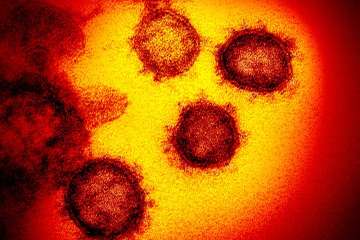Nasal swab samples from bodies of suspected COVID-19 cases should be collected for testing of coronavirus infection at the emergency before moving the body to mortuary, the ICMR said. According to the 'Standard Guidelines for Medico-legal autopsy in COVID-19 deaths in India' released by the ICMR on Tuesday, if the COVID-19 test report is awaited, the dead body must not be released from the mortuary until the final report is received and after the formalities, it must be handed over to the district administration.
"It is advisable to collect Nasopharyngeal swab at the emergency department/casualty/ward/ICU and should be sent for COVID-19 RT-PCR test in all suspected cases before moving the body to mortuary for preservation if the same was not sent in due hospital course," the guidelines said.
Asymptomatic infected people and patients in incubation period may not meet the diagnostic criteria for suspected cases, but if they have possible epidemiological history, all dead bodies without reliable clinical/epidemiological history and all unidentified dead bodies should be treated as suspected COVID-19 deaths.
"Cases with negative swab results also should be treated as suspected COVID-19 deaths as false negative result is not uncommon," the guidelines stated. At no time, more than two relatives must be present near the body and they must maintain a distance of at least one meter from the body.
The body must be identified through the plastic bag, without opening the bag, and it must be done in the presence of law enforcing agencies.
"The body must be taken to the burial/cremation ground in presence of law enforcing agencies, where not more than five relatives of the deceased should be allowed," it said. In case of burial, upper surface should be cemented and earmarked.
The body must be cremated in electric crematorium, wherever possible, so that the movement and handling of the body is minimised, the guidelines stated. Religious rituals which require touching the bodies should be avoided like bathing, kissing and hugging of the dead bodies, the document said, adding the ashes do not pose any risk and can be collected to perform the last rites.
As for the ideal depth of burial of dead body, the ICMR said as per available literature and reports, the burial is being done at a depth of six to eight feet.
During autopsy or while handling the dead body, if anyone get accidental occupational exposure with body fluids/tissues of a COVID-19 patient, then immediately the entire exposed area should be washed with soap and water with minimum contact time of 20 seconds. This should be followed by application of 70 per cent alcohol based disinfectant.
The exposed clothes/ articles should be disposed off according to the established practices. The matter should be reported to the hospital administration to evaluate the necessary steps accordingly, the ICMR added.
Latest India News
